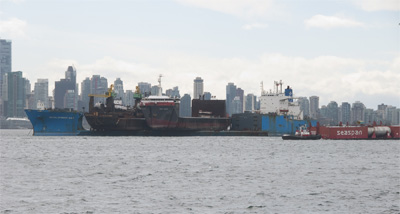Western Canada’s tugboat industry was built on the transport of logs from up-coast logging operations to south coast lumber and paper mills. Recently the British Columbia government has allowed the export of unprocessed logs, resulting in the closure of many mills. Increasingly the foreign-flagged log ships are going directly to the logging areas on the north coast and the west coast of Vancouver Island to load logs.
 |
|
Alan Haig-Brown |
|
Canadian logging vessels loaded in March onto the 705-foot semi-submersible ship Development Way in Vancouver, British Columbia, await shipment to China. |
With the rapid cutting and export of the coastal forests, there has been a great reduction in the log-towing industry. In 2010, SMIT Harbour Towage sold its offshore fleet of west coast tugs to Seaspan Marine Corp., the largest towing company on the coast. With the declining demand for towing, Seaspan has been shipping tugs to China for scrapping rather than selling the tugs in Canada.
In March, nine tugs were loaded onto the deck of the self-loading and self-dumping log barge Straits Logger. This conglomeration, along with the log ship Haida Brave, was then loaded onto the 705-foot semi-submersible Development Way. One of the larger tugs, the 1971-built Mercer Straits, is a twin-screw 1,800-hp vessel.
The 5,750-hp log barge Haida Brave is 387 feet long, while Straits Logger is 367 feet long. As the beam of the ship Development Way is only about 125 feet, there remains a good bit of the bow and stern of the two large vessels hanging off the sides of the heavy lift ship.
As one wag commented, “We best tell our friends in Alaska that they have a salvage job on the way.”
Such thoughts may have to do with the several days that the ship and its cargo remained at anchor in Vancouver’s inner harbor.
